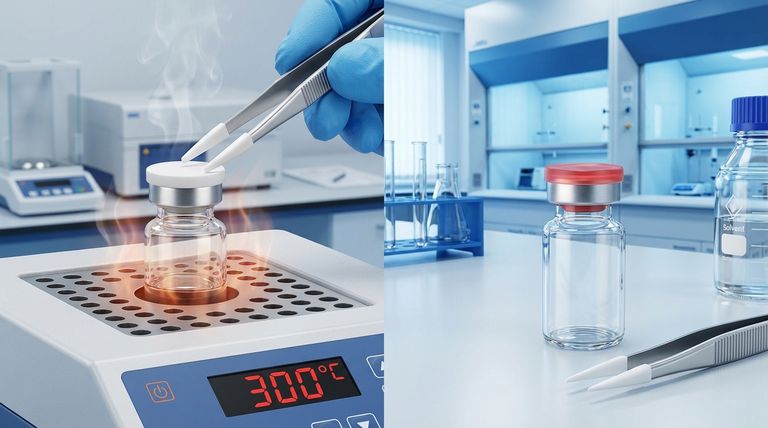In a direct comparison, both PTFE and silicone septa offer a broad operational temperature range, but PTFE is superior, especially for applications involving very high temperatures. While silicone performs well across a wide spectrum, it does not match PTFE's stability at extreme temperature highs.
The decision between PTFE and silicone septa is rarely about temperature alone. It requires balancing the necessary temperature stability against chemical resistance and overall cost to match the specific demands of your laboratory procedure.

A Head-to-Head Comparison of Core Properties
To select the right septum, you must understand how these materials differ across several key performance metrics beyond just their thermal limits.
Temperature Stability
PTFE septa are engineered to withstand both extreme high and low temperatures, making them the default choice for applications requiring exceptional thermal stability.
Silicone septa also function reliably across a wide temperature range. However, they may not handle the highest temperatures as effectively as their PTFE counterparts, which is a critical limitation in certain analytical methods.
Chemical Resistance
This is often the most significant differentiator. PTFE is exceptionally inert and offers robust resistance against nearly all acids, bases, and organic solvents.
Silicone, while generally inert, can swell or degrade when exposed to certain organic solvents or strong acids. This makes it unsuitable for procedures involving highly reactive or aggressive chemical environments.
Permeability and Sealing
PTFE has very low permeability, providing an excellent seal against gases and preventing sample contamination from external sources. This is vital for maintaining sample integrity over time.
Silicone exhibits moderate permeability. This is perfectly acceptable for many applications but can be a drawback if a perfect seal is required. In some cases, like headspace sampling, this property can even be beneficial.
Understanding the Trade-offs
Choosing a septum is an exercise in balancing performance requirements with practical constraints like budget and the nature of the work.
The Impact of Cost
PTFE septa are generally more expensive. This higher cost is a direct result of their superior chemical resistance and temperature stability.
Silicone septa are a more cost-effective solution. Their lower price point makes them a practical choice for routine, high-volume laboratory procedures.
When Performance Justifies the Price
The premium for PTFE is justified when the integrity of your analysis depends on its superior properties. If you are working with aggressive chemicals or at the limits of the temperature range, PTFE is a necessary investment.
For standard procedures where high chemical resistance or extreme temperature stability is not a primary concern, silicone provides reliable performance at a much lower cost.
Making the Right Choice for Your Application
Your final decision should be guided by the specific requirements of your analytical work.
- If your primary focus is maximum temperature stability and chemical inertness: PTFE is the unambiguous choice for protecting your sample and ensuring accurate results.
- If your primary focus is cost-effectiveness for routine procedures: Silicone provides excellent value and reliable performance for less demanding applications.
- If your primary focus is preventing gas exchange and contamination: PTFE's low permeability creates a more effective and reliable seal.
Ultimately, selecting the correct septum is about precisely matching the material's capabilities to the demands of your analysis.
Summary Table:
| Property | PTFE Septa | Silicone Septa |
|---|---|---|
| Temperature Stability | Superior for extreme high/low temperatures | Good across a wide range, but limited at extreme highs |
| Chemical Resistance | Excellent; inert to most acids, bases, and solvents | Good, but can swell/degrade with certain solvents/strong acids |
| Permeability | Very low; excellent seal against gas exchange | Moderate; acceptable for many uses |
| Cost | Higher | More cost-effective |
Need High-Performance PTFE Septa for Demanding Applications?
KINTEK specializes in manufacturing precision PTFE components, including septa, seals, and custom labware. We understand that your analytical results depend on the reliability of every component.
We provide:
- Superior Material Performance: Our PTFE septa offer the exceptional temperature stability and chemical inertness your critical procedures require.
- Custom Fabrication: From prototypes to high-volume orders, we tailor solutions to meet your exact specifications.
- Uncompromising Quality: We prioritize precision production for components you can trust in semiconductor, medical, laboratory, and industrial settings.
Let us help you protect your samples and ensure accurate results. Contact our experts today to discuss your specific needs!
Visual Guide

Related Products
- Custom PTFE Parts Manufacturer for Teflon Parts and PTFE Tweezers
- Custom PTFE Parts Manufacturer for Teflon Containers and Components
- Custom PTFE Sealing Tapes for Industrial and High Tech Applications
- PTFE Chemical Solvent Sampling Spoon
- Custom PTFE Bottles for Diverse Industrial Applications
People Also Ask
- What other PTFE lab accessories are commonly used? Essential Tools for Chemical Resistance & Purity
- What makes the PTFE bottle durable? Unmatched Chemical & Thermal Stability for Demanding Applications
- What are the advantages of using PTFE lined caps? Superior Sealing for Volatile Liquids & High-Temp Storage
- Why are PTFE/silicone septums considered essential in chromatographic analysis? Ensure Data Integrity and Purity
- How does the PTFE bottle perform in terms of chemical resistance? Unmatched Protection for Harsh Chemicals
- How do Teflon membranes improve the functionality of gas chromatography? Achieve Purer, More Accurate Results
- What are the chemical resistance properties of PTFE labware? The Ultimate Guide to Inert Labware
- How does the ergonomic design of PTFE shovels benefit users? Reduce Strain and Boost Lab Efficiency



















